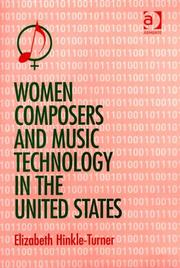| Listing 1 - 10 of 26 | << page >> |
Sort by
|
Book
ISBN: 2819939937 Publisher: S.l. : Pub One Info,
Abstract | Keywords | Export | Availability | Bookmark
 Loading...
Loading...Choose an application
- Reference Manager
- EndNote
- RefWorks (Direct export to RefWorks)
Classic text republished as an e-book.
Book
ISBN: 9781847378439 1847378439 Year: 2011 Publisher: London : Simon & Schuster, Limited,
Abstract | Keywords | Export | Availability | Bookmark
 Loading...
Loading...Choose an application
- Reference Manager
- EndNote
- RefWorks (Direct export to RefWorks)
On September 11th 2001, 32-year-old Elizabeth Turner was working at Channel 4 when news broke of the attacks on the World Trade Centre. Surrounded by TV screens, like her colleagues, she watched as the horror unfolded. But for Elizabeth, the atrocities were all the more painful - her husband Simon was at a meeting in the restaurant at the top of the towers as the planes crashed into them. Elizabeth was seven months pregnant with their first child. As the destruction unfolded, and Simon did not call, Elizabeth's world crumbled, and she spiralled into an abyss of grief more painful than most of us can imagine. This immensely moving memoir packs a powerful emotional punch, and hooks the reader from the first page. The author eloquently describes how she had to hit rock bottom before she could start rebuilding a life for herself and her young son William. That she was able to recover at all is testament to the power of the human spirit. But more than this, Elizabeth has forged a completely new life and career and is now living what she calls her 'ultimate life'. Her story offers hope that there is a way through the worst experiences - not with quick-fix solutions but by moving deep within yourself to bring about complete healing and recovery.
Grief. --- Bereavement. --- Grief --- Bereavement
Book
ISBN: 0835718778 Year: 1988 Volume: vol 62 Publisher: Ann Arbor London UMI Research Press
Abstract | Keywords | Export | Availability | Bookmark
 Loading...
Loading...Choose an application
- Reference Manager
- EndNote
- RefWorks (Direct export to RefWorks)
Americans --- -Artists --- -Expatriate artists --- -Art, American --- -Art, French --- -Art, Modern --- French art --- Ecole de Nice (Group of artists) --- Forces nouvelles (Group of artists) --- Nabis (Group of artists) --- Ne pas plier (Group of artists) --- American art --- Eight (Group of American artists) --- Indian Space (Group of artists) --- Mission School (Group of artists) --- NO!Art (Group of artists) --- Old Bohemians (Group of artists) --- Stieglitz Circle (Group of artists) --- Artists, Expatriate --- Exiled artists --- Artists --- Exiles --- Persons --- Yankees --- Ethnology --- History --- -Americans --- -History --- Art, American --- Art, French --- Expatriate artists --- Art, Modern --- Artists [Expatriate ] --- France --- Paris (France) --- United States --- Art [French ] --- Art [American ] --- Art [Modern ] --- 20th century --- Artists, Expatriate - France - Paris. --- Artists - United States. --- Art, French - France - Paris. --- Art, American - France - Paris. --- Art, Modern - 20th century - France - Paris. --- Americans - France - Paris - History - 20th century.

ISBN: 0711703078 0711703248 Year: 1987 Publisher: Norwich ; London : Jarrold,
Abstract | Keywords | Export | Availability | Bookmark
 Loading...
Loading...Choose an application
- Reference Manager
- EndNote
- RefWorks (Direct export to RefWorks)
Historic sites --- Historic buildings --- Lieux historiques --- Monuments historiques --- England --- Great Britain --- Angleterre --- Grande-Bretagne --- Description and travel --- Anecdotes --- History --- Descriptions et voyages --- Histoire --- Anecdotes. --- Guides
Book
ISBN: 3319678973 3319678965 Year: 2018 Publisher: Cham : Springer International Publishing : Imprint: Palgrave Macmillan,
Abstract | Keywords | Export | Availability | Bookmark
 Loading...
Loading...Choose an application
- Reference Manager
- EndNote
- RefWorks (Direct export to RefWorks)
In this book, Liz Turner argues that survey methods have gained an unwarranted and unhealthy level of dominance when it comes to understanding how the public views the criminal justice system. The focus on measuring public confidence in criminal justice by researchers, politicians and criminal justice agencies has tended to prioritise the production of quantitative representations of general opinions, at the expense of more specific, qualitative or deliberative approaches. This has occurred not due to any inherent methodological superiority of survey-based approaches, but due to the congruence of the survey-based, general measure of opinion with the prevailing neoliberal political tendency to engage with citizens as consumers. By identifying the historical conditions on which contemporary knowledge claims rest, and tracing the political power struggles out of which sprang the idea of public confidence in criminal justice as a real and measurable object, Turner shows that things could be otherwise. She also draws attention to the ways in which survey researchers have asserted their dominance over other approaches, suppressing convincing claims by advocates of deliberative methods that a better politics of crime and justice is possible. Ultimately, Turner concludes, researchers need to be more upfront about their political objectives, and more alert to the political responsibilities that go along with the making of knowledge claims. Providing a provocative critique of the dominant approaches to measuring public confidence, this timely study will be of special interest to scholars of the criminal justice system, research methods, and British politics.
Public policy. --- Great Britain --- Crime --- Criminology and Criminal Justice. --- Criminal Justice. --- Crime and the Media. --- Crime and Society. --- Research Methods in Criminology. --- Public Policy. --- British Politics. --- Politics and government. --- Sociological aspects. --- Judicial process --- Criminal justice, Administration of. --- Mass media and crime. --- Crime—Sociological aspects. --- Criminology. --- Research. --- Great Britain-Politics and gover. --- Crime and mass media --- Science --- Science research --- Scientific research --- Information services --- Learning and scholarship --- Methodology --- Research teams --- Social sciences --- Criminals --- Administration of criminal justice --- Criminal justice, Administration of --- Justice, Administration of --- Criminal law --- Research --- Study and teaching --- Law and legislation --- Great Britain—Politics and government. --- Great Britain. --- Anglia --- Angliyah --- Briṭanyah --- England and Wales --- Förenade kungariket --- Grã-Bretanha --- Grande-Bretagne --- Grossbritannien --- Igirisu --- Iso-Britannia --- Marea Britanie --- Nagy-Britannia --- Prydain Fawr --- Royaume-Uni --- Saharātchaʻānāčhak --- Storbritannien --- United Kingdom --- United Kingdom of Great Britain and Ireland --- United Kingdom of Great Britain and Northern Ireland --- Velikobritanii͡ --- Wielka Brytania --- Yhdistynyt kuningaskunta --- Northern Ireland --- Scotland --- Wales

ISBN: 0754604616 9780754604617 Year: 2006 Publisher: Aldershot ; Burlington Ashgate
Abstract | Keywords | Export | Availability | Bookmark
 Loading...
Loading...Choose an application
- Reference Manager
- EndNote
- RefWorks (Direct export to RefWorks)
Electronic music --- History and criticism --- Computer music --- Women composers --- United States

ISBN: 0203065824 1299460151 1136636374 141750000X 9781417500000 9780203065822 9781136636370 9781136636516 113663651X 9781136636448 1136636447 9781138149496 1138149497 9780203065822 185346967X 9781853469671 9781299460157 9780203803868 0203803868 Year: 2003 Publisher: London David Fulton
Abstract | Keywords | Export | Availability | Bookmark
 Loading...
Loading...Choose an application
- Reference Manager
- EndNote
- RefWorks (Direct export to RefWorks)
The difficulties dyslexic students experience in the English mainstream classroom and present to their English teacher are examined in detail in this book. The authors show how these difficulties may best be supported and the students' strengths utilized. The book looks at language, different types of literature and poetry, and highlights the use of the written language. Handwriting, reading, comprehension, writing and spelling strategies are also considered.
Dyslexia. --- Developmental dyslexia --- Word-blindness, Partial --- Language disorders --- Reading disability --- Alexia
Book
ISBN: 1887178015 Year: 1995 Publisher: Washington (D.C.) Counterpoint
Abstract | Keywords | Export | Availability | Bookmark
 Loading...
Loading...Choose an application
- Reference Manager
- EndNote
- RefWorks (Direct export to RefWorks)
Multi
ISBN: 9783319678979 3319678973 Year: 2018 Publisher: Cham : Springer International Publishing : Imprint: Palgrave Macmillan,
Abstract | Keywords | Export | Availability | Bookmark
 Loading...
Loading...Choose an application
- Reference Manager
- EndNote
- RefWorks (Direct export to RefWorks)
In this book, Liz Turner argues that survey methods have gained an unwarranted and unhealthy level of dominance when it comes to understanding how the public views the criminal justice system. The focus on measuring public confidence in criminal justice by researchers, politicians and criminal justice agencies has tended to prioritise the production of quantitative representations of general opinions, at the expense of more specific, qualitative or deliberative approaches. This has occurred not due to any inherent methodological superiority of survey-based approaches, but due to the congruence of the survey-based, general measure of opinion with the prevailing neoliberal political tendency to engage with citizens as consumers. By identifying the historical conditions on which contemporary knowledge claims rest, and tracing the political power struggles out of which sprang the idea of public confidence in criminal justice as a real and measurable object, Turner shows that things could be otherwise. She also draws attention to the ways in which survey researchers have asserted their dominance over other approaches, suppressing convincing claims by advocates of deliberative methods that a better politics of crime and justice is possible. Ultimately, Turner concludes, researchers need to be more upfront about their political objectives, and more alert to the political responsibilities that go along with the making of knowledge claims. Providing a provocative critique of the dominant approaches to measuring public confidence, this timely study will be of special interest to scholars of the criminal justice system, research methods, and British politics.
Science --- Social problems --- Internal politics --- International relations. Foreign policy --- Economic policy and planning (general) --- Criminology. Victimology --- Mass communications --- maatschappij --- massamedia --- media --- onderzoeksmethoden --- criminologie --- seksuologie --- criminaliteit --- Europese politiek --- binnenlandse politiek --- Great Britain --- Law and the social sciences. --- Mass media and crime. --- Crime --- Criminology. --- Political planning. --- Europe --- Socio-Legal Studies. --- Crime and the Media. --- Crime and Society. --- Research Methods in Criminology. --- Public Policy. --- European Politics. --- Sociological aspects. --- Politics and government.
Book
ISBN: 9780367423261 Year: 2022 Publisher: London New York Routledge
Abstract | Keywords | Export | Availability | Bookmark
 Loading...
Loading...Choose an application
- Reference Manager
- EndNote
- RefWorks (Direct export to RefWorks)
A comprehensive, engaging and timely Bakhtinian examination of the ways in which the music and lyrics of Pacific reggae, aspects of performance, a record album cover and the social and political context construct social commentary, resistance and protest. Framed predominantly by the theory and philosophy of Russian literary theorist Mikhail Bakhtin, this innovative investigation of the discourse of Pacific reggae in New Zealand produces a multi-faceted analysis of the dialogic relationships that create meaning in this genre of popular music. It focuses on the award-winning EP What’s Be Happen? by the band Herbs, which has been recognised for its ground-breaking music and social commentary in the early 1980s. Herbs’ songs address the racism and ideology of the apartheid regime in South Africa and the relationship between sport and politics, as well as universally relevant conflicts over race relations, the experiences of migrants, and the historic and ongoing loss of indigenous people’s lands. The book demonstrates the striking compatibility between Bakhtin’s theorisation of utterances as ethical acts and reggae music, along with the Rastafari philosophy that underpins it, which speaks of resistance to social injustice, of ethical values and the kind of society people seek to achieve. It will appeal to a cross-disciplinary audience of scholars in Bakhtin studies; discourse analysis; popular cultural studies; the literary analysis of popular music and lyrics, and those with an interest in the culture and politics of Aotearoa New Zealand and the Pacific region.
| Listing 1 - 10 of 26 | << page >> |
Sort by
|

 Search
Search Feedback
Feedback About UniCat
About UniCat  Help
Help News
News